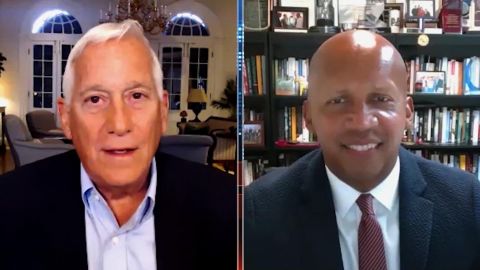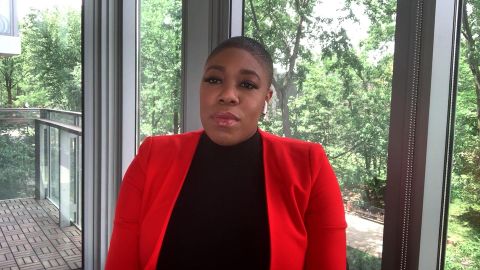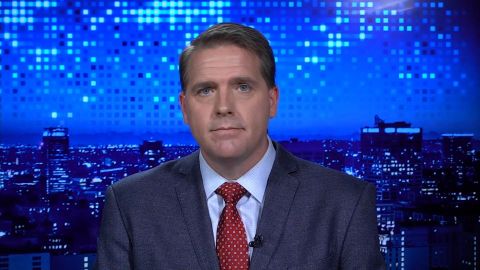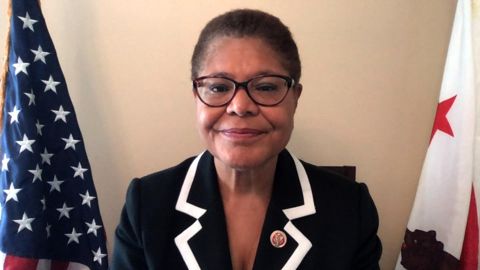Read Transcript EXPAND
CHRISTIANE AMANPOUR: Now, the root causes of racial injustice in America is fundamental to achieving lasting change, at least denying those root causes. And our next guest has dedicated his life to doing just that. Bryan Stevenson is a leading civil rights lawyer who made his name saving dozens of wrongfully convicted inmates from execution through his Equal Justice Initiative. And he’s joining our Walter Isaacson to talk about solutions, from rethinking policing to finally embracing truth and reconciliation.
(BEGIN VIDEOTAPE)
WALTER ISAACSON: Thank you, Christiane. And, Bryan Stevenson, welcome to the show.
BRYAN STEVENSON, FOUNDER, EQUAL JUSTICE INITIATIVE: Thank you.
ISAACSON: Bryan, when you watch that video of Mr. Floyd getting killed with the officer’s knee on his neck crying out, tell me your emotions. Tell me what go into your head.
STEVENSON: Well, it’s frustration and anger, because we have seen this kind of violence for decades. And it’s frustrating to me, because, five years ago, I was part of a task force that was convened by the White House, motivated by too many of these incidents of police violence, that attempted to create solutions. And we spent months going around the country. We held hearings. We had police chiefs and activists and academics and experts and community leaders all come together. And we have 40 pages of recommendations that I believe would make it less likely that we would see the kind of violence that we see in that video.
ISAACSON: What happened to those recommendations?
STEVENSON: Well, they have been completely abandoned. The new administration came in, retreated from implementing any of those reforms, didn’t create the financial incentives for communities to take up these recommendations. And the infrastructure in the Justice Department largely disintegrated, so that we don’t have that kind of pressure, that kind of effort. The Justice Department withdrew from lawsuits that have been made against cities that have engaged in problematic behavior. And the environment shifted in a way that didn’t create and sustain the pressure that was created.
ISAACSON: Well, tell me about some of those recommendations. Give me a couple of them that you think we should be doing.
STEVENSON: Sure. Well, I mean, it’s all about changing the culture of policing. We have too many police officers in this country who are trained as soldiers. We teach them how to shoot. We teach them how to fight. We teach them how to restrain people. We don’t teach them how to help people in a mental health crisis, how to interact with people who are psychotic. We don’t teach them how to de-escalate confrontations. They don’t know how to manage, with the skill that they should manage, complex situations when people of color and others have been provoked. And because that orientation has reinforced a mind-set where police officers too often think of themselves as warriors, rather than guardians, what we saw in Minneapolis. And then, of course, we have got to get community engagement. We’ve got to change the role of community members. Policing is seen as this distinct fraternal order, with a few government officials implicated. It’s like the police belong to the police, not to the community. And it doesn’t have to be that way. The cities that have made progress on these issues are communities where citizens and community leaders have a direct role in the hiring and the development of policies and protocols. When that happens, you have a partnership between communities and police that’s not only good for the police and the community. It’s good for public safety. That’s how you promote public safety.
ISAACSON: You try to put all this in the context of history. I go to your Equal Justice Initiative Web site and sign up for things. And every day, there’s a listing of today in history, where things happened involving racial equity.
STEVENSON: Yes.
ISAACSON: And coming up in a few days on the show is Juneteenth. That’s on the calendar. Tell me about that. And what was the legacy, the narrative coming out of Juneteenth?
STEVENSON: Yes, well, I do think it’s important, Walter, to kind of emphasize that, when we talk about this police violence, we also have to talk about who have been the primary targets of this violence, who has had to bear this burden. And black Americans have been disproportionately targeted and victimized. And that has to do with this larger historical narrative. It has to do with this legacy of racial injustice that we have never confronted. And you’re right. In a couple of weeks, it will be the 155th anniversary of when emancipated black people celebrated the end of slavery on Juneteenth. And those formerly enslaved people believed that their rights, their dignity, their humanity was now going to be embraced, that they were going to be welcomed as full citizens in the United States. And, instead of that happening, we saw the opposite. They were denied the right to vote. They were denied the property that had been promised. They were actually targeted and victimized. And we have never reckoned with that problem, which is why I do think we will not see meaningful change until we start this process of truth and justice that has been long delayed in America. The great evil of American slavery wasn’t the involuntary servitude and forced labor. Slave owners and slavers needed a narrative to justify the brutality of slavery. And so they came up with this fiction that black people aren’t as good as white people, that black people aren’t evolved, that we’re not human, we can’t do this, we can’t do that, black people are inferior, and white people are superior. And that ideology of white supremacy, that was the real evil of American slavery. And even though we ended involuntary servitude and forced labor with the 13th Amendment, we never acknowledged this problem of white supremacy. We didn’t address it, which is why I have argued that slavery doesn’t end in 1865. It just evolves. Because of that doctrine, Reconstruction fails. The effort to protect black people, with the 15th Amendment guaranteeing the right to vote and the 14th Amendment to equal protection fails, because we’re still committed to this doctrine of white supremacy. And Southern white militias violently take control over these states with large black populations and subject black people to conditions that are oppressive.
ISAACSON: Are we acknowledging that ideology of white supremacy enough today?
STEVENSON: No. We — and I think, until we know this history, we won’t be able to. That is, I think we have done a terrible job of acknowledging the history. Most people don’t know anything about the mass lynchings of black people during Reconstruction. They know too little about what happened in the first half of the 20th century. We act as if we have been — we dealt with this problem of racial bias a long time ago. I’m not 100 years old. I was born at a time when black people couldn’t go to public schools. I started my education in a colored school. I couldn’t — black people could not marry anybody they wanted to. We were restricted by interracial — bans on interracial marriage. We haven’t repaired or remedied many of the problems that was created by bias. And you see it in the voting context. We told black people, you can’t vote for 100 years. And rather than trying to remedy that problem, we said, OK, maybe we will stop blocking you from voting through law. Maybe we will let some black people go to public school, as if that’s a remedy. That’s an insufficient remedy to a century of disenfranchisement, in the same way that we’re seeing these problems manifest in other areas. But, more than that, we need to commit to truth and repair, to truth and restoration, truth and reconciliation. And the first step is the truth- telling. I think people make a mistake when they try to get to the reconciliation conversation or even the reparation conversation before knowing what the truth is. And the truth is, is that we have done a lot of damage to black and brown communities for a very long time, which means that we’re going to have to do a lot to repair and remedy much of that damage.
ISAACSON: What would you recommend for a truth and reconciliation process in the United States?
STEVENSON: Well, I think the first thing begins with valuing the construct. I’m a person of faith. And in my faith tradition, you can’t just walk into church and say, I want all the benefits and gifts of being a member, I want all of the fruits of salvation, and I’m not going to say anything about anything bad I have done. The construct requires that there be repentance. That is that you create an environment where people can actually acknowledge wrongdoing, so that there can be the opportunity for recovery. And I think we need to do that. And we begin to do that by affirming the wrongfulness of enslavement, which you can’t do if you celebrate the architects and defenders of slavery. You begin to do that by creating opportunities for people to reckon with what they have done. We do markers. We put up markers at lynching sites all across the region. And when we do these markers, I actually would love for police chiefs and sheriffs to show up in their uniforms. And I think it’s appropriate for those individuals to stand up and apologize that the people wearing those uniforms 80 years ago, 100 years ago failed to protect black people from terroristic violence. And I think it’s appropriate for them to say, the people wearing this uniform failed you, and I want you to know that now I’m wearing this uniform and I don’t want to fail. I want to commit to protect you. I want to commit to serve you. That doesn’t take money. It doesn’t take a budget. It doesn’t take a lot of time. It just takes a willingness to acknowledge this history. And nine times out of 10, we can’t get that police chief there. We can’t get that sheriff there. And that has to change. We have to be willing to have the courage to reckon with this mystery. I’m hearing from people now who come to our museum whose parents participated in the beatings of Freedom Riders, whose parents participated in violence directed at nonviolent protests. And they have never been required to think critically about the wrongfulness of that. And you see a lot of emotion in our sites. So I think we have to create that space. And truth commissions, truth-telling begins with being honest about how we got here.
ISAACSON: Part of the history that you try to have us confront are the 4,000 or so lynchings, hanging, burnings, brutal murders that happened post-Reconstruction up until the modern era. Do you think that those lynchings, in some ways, there’s a direct line, or at least a symbolic line, to people feeling they can put their knee on Mr. Floyd’s neck, the way officer Derek Chauvin did?
STEVENSON: Yes, I don’t think there’s any question that we have created an American narrative that the victimization of black people is not as serious, is not as important as the victimization of white people. We have actually created a tolerance of violence against black people that is evident in so many of these acts. And we’re about to issue a report in a couple of weeks on the level of lynching and — during the Reconstruction era, when some thousands of black people were murdered, sometimes on the streets, and the federal government did nothing about that. And what that said was, it’s not a big deal if you kill a lot of black people, that we have been focusing on the pandemic, Spanish Flu pandemic of 1918, as if it happened by itself. We have ignored all of the violence at black people that took place in 1919, the Tulsa massacre, violence in Elaine, Arkansas where hundreds of black people were killed by white mobs. And the federal government did nothing. When you constantly see this sort of violence with no repercussions, where there is no accountability, from the early days of lynching, to the murder of Emmett Till, to police violence in the ’60s and ’70s and ’80s and ’90s, you send a message that, if you’re going to victimize someone, if you’re going to be violent, and it’s a person of color or a black person, you don’t have to worry so much about the repercussions. And that’s at the heart of this thing. I mean, police police differently in affluent communities. When the police go into an affluent white community, they don’t run over people’s lawns. They don’t pull people out of their homes. They don’t throw people down on the street, because they know that those people have access to judges and prosecutors and mayors. They have power to hold those officers accountable. In poorer minority communities, we don’t have that same power. And the violence that you see is the result of that.
ISAACSON: This current, latest crisis on police brutality and police killings comes amid a perfect storm of things for the African-American community, including coronavirus hitting the African-American community much harder, the collapse of a economy that really penalizes wage earners far more than people with wealth. What do you make of this incredibly weird, dangerous period? And how can we get out of it?
STEVENSON: Well, it’s unquestionably a very challenging time, for all the reasons that you cite. I think, for me, what’s important to remember about this, I think there’s been a lot of indifference, that, somehow, we were in a better place than we actually were. And I’m hoping that this moment galvanizes a kind of awareness that we still have a lot of work to be done. I am worried about the economic consequences of this pandemic for poor and minority communities. I am worried about the continuation of this police violence. I’m worried about the structural problems that we will have a hard time overcoming. But I’m — I live in Montgomery, Alabama. I stand on the shoulders of people who did so much more with so much less in the 1950s and ’60s. I am the heir of a generation of black people who would put on their Sunday best and go places where they knew they’d be bloodied and battered, and yet they went anyway. I’m the great-grandson of people who were enslaved. And my foreparents found a way to overcome and survive enslavement. And my grandparents found a way to overcome and survive terrorism and lynching. And my parents overcame and survived the humiliation of segregation. And so no one gets to say that things are so bad right now that we cannot find a way forward. We have more resources, more capacity, more intellectual and political opportunities than we have ever had before in this country. And so it’s a question of will. Will we use our capacity to create more justice, to create more equality, to confront political institutions that do not value the need for equality and justice, that continue to perpetrate policies and institutions that are biased and bigoted? That’s the question. We have had — we have more capacity now than we have ever had before. The question is, do we have the same conviction, the same commitment, and the same resolve to eliminate bigotry and bias? If we have that, then we will actually move toward a time — I’d like for another generation at some point in the future to not be having these conversations on television about the continuing legacy of these problems. But to get there, we have a role — all have a role to play.
ISAACSON: You just got invited back to Harvard Law School to give a type of commencement speech in this crazy period. And you told them that hope is their superpower. Explain how that fits in to the optimism that you’re trying to express
STEVENSON: Well, yes, I just think we cannot succeed if we become hopeless. Hopelessness is the enemy of justice. I think injustice prevails where hopelessness persists. And it’s why I reject violence. I think violence is kind of rooted in a kind of hopeless despair. I think we have to be hopeful. Hope is what allows us to believe things we haven’t seen. I have been practicing law for 35 years. We have gotten a lot of people off of death row. We have gotten a lot of people wrongly convicted freed. I had to believe that could happen, even though I hadn’t seen that happen before. I never met a lawyer before I went to Harvard Law School. I had to believe I could be something I hadn’t seen. I just think hope is what empowers you to do the things that have to be done. Hope will get you to stand up when other people say, sit down. Hope we will get you to speak when other people say, be quiet. If I learned anything from Rosa Parks and the generation of extraordinary people who lived in this community, E.D. Nixon, Johnnie Carr, is that you have to be hopeful about what you can do, even when you don’t feel like you have a lot to do it with.
ISAACSON: Bryan Stevenson, thank you for sharing your hope and your exhortations. Stay healthy. Stay well.
STEVENSON: Thank you so much.
About This Episode EXPAND
Symone Sanders joins Christiane Amanpour to discuss Vice President Joe Biden’s speech in Philadelphia today. Scott Jennings examines President Trump’s response to protests across the U.S. Rep. Karen Bass (D-CA) explains how she is coordinating the formulation of new policing legislation. The Equal Justice Initiative’s Bryan Stevenson explains the need to change the culture of policing.
LEARN MORE



